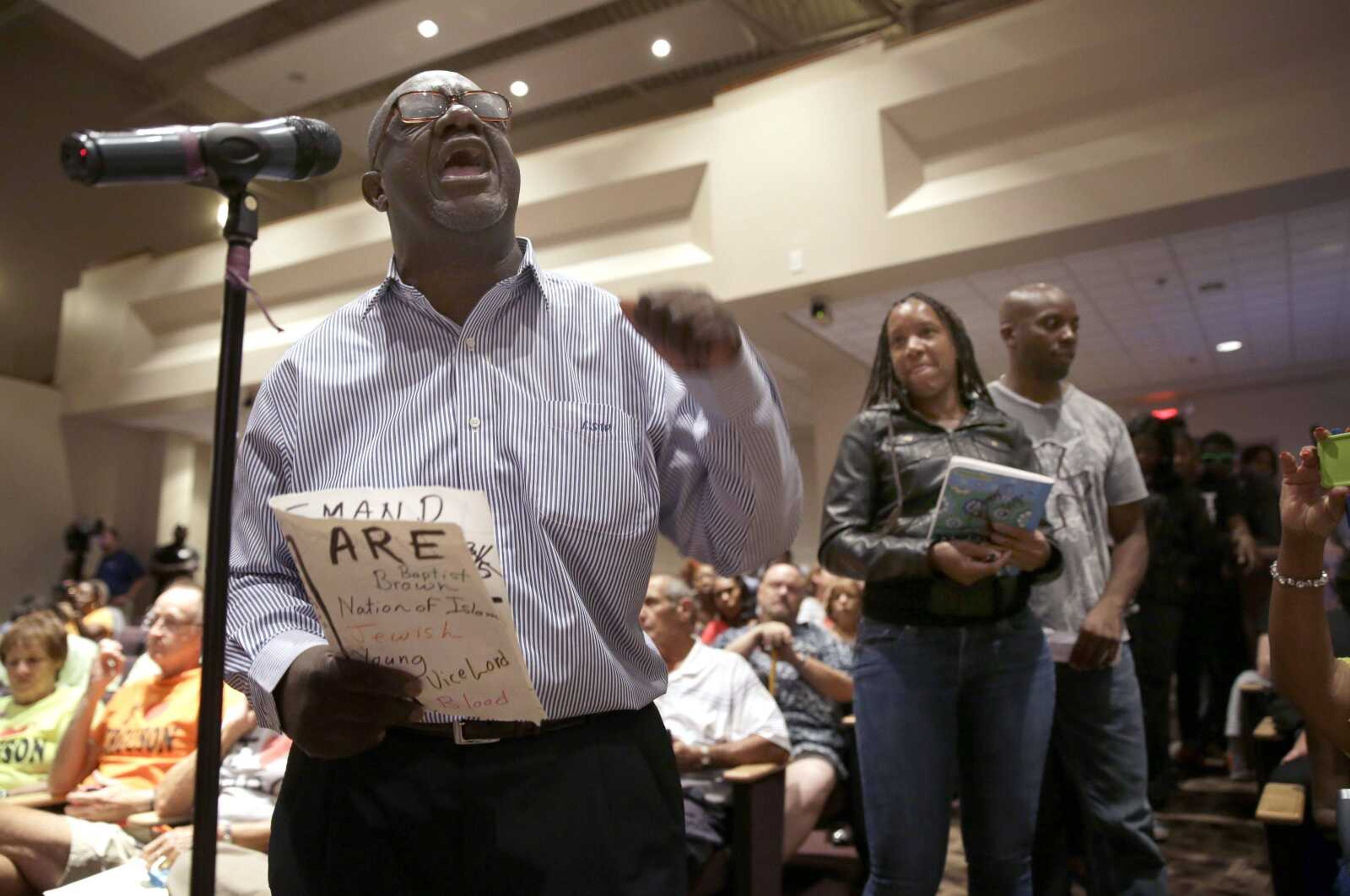Ferguson reforms met with rancor at council meeting
FERGUSON, Mo. -- Efforts by city leaders in the St. Louis suburb where an unarmed black 18-year-old was fatally shot by a white police officer to repair the local government's fractured relationship with its residents got off to a rocky start Tuesday at the first public meeting of elected officials since Michael Brown's death...
FERGUSON, Mo. -- Efforts by city leaders in the St. Louis suburb where an unarmed black 18-year-old was fatally shot by a white police officer to repair the local government's fractured relationship with its residents got off to a rocky start Tuesday at the first public meeting of elected officials since Michael Brown's death.
The shooting last month exposed an undercurrent of racial unrest in Ferguson and other nearby suburbs in mostly black communities of north St. Louis County and prompted days of sometimes violent protests.
The Ferguson City Council announced a set of proposals this week that include reducing the revenue from court fines used for general city operations and reforming court procedures. Critics say reliance on court revenue and traffic fines to fund city services more heavily penalizes low-income defendants who can't afford private attorneys and who often are jailed for not promptly paying those fines.
The city also plans to establish a citizens' review board to help guide the police department.
Within minutes of the start of Tuesday night's meeting -- where the proposals were being discussed -- several demonstrators stood up and shouted as the council tried to cover some routine business. Later, others stood up and chanted, "Shut it down!" while raising their hands in the air. Protesters have used the gesture because several witnesses say Brown had raised his hands as officer Darren Wilson shot him.
The first speaker to take the microphone during the public comment period said he was there for the mayor's job. It was a theme echoed throughout, as speaker after speaker expressed doubt about the city's planned reforms -- and anger at the government officials seated on the podium.
"You've lost your authority to govern this community," said St. Louis activist John Chasnoff. "You're going to have to step aside peacefully if this community is going to heal."
The meeting exactly one month after Brown's death was the council's first public session since he was killed. It was held in a local church to accommodate a crowd of several hundred who had to walk through metal detectors at entrances guarded by a heavy police presence.
The U.S. Justice Department announced last week it was launching a broad investigation into the Ferguson Police Department, looking for patterns of discrimination. That inquiry is separate from the one into Brown's death, which a local grand jury is also investigating.
Ferguson, a city of 21,000, is about 70 percent black. Its 53-member police department has just three black officers. The mayor and five of the six City Council members are white.
A 2013 report by the Missouri attorney general's office found Ferguson police stopped and arrested black drivers nearly twice as often as white motorists, but were less likely to find contraband among the black drivers.
In the last fiscal year, court fines and fees accounted for $2.6 million, or nearly one-fifth of the city budget. That's nearly twice as much as the city collected two years earlier.
Councilman Mark Byrne said before the meeting that the goal of the proposed changes "is to improve trust within the community and increase transparency."
Police have said the shooting of Brown came followed a scuffle after Wilson told Brown and a friend to move out of the street and onto a sidewalk. Autopsies concluded Brown was shot at least six times.
Earlier Tuesday, Brown's parents joined about 20 supporters and activists at a news conference outside police headquarters to reiterate calls for Wilson's immediate arrest.
Also Tuesday, a St. Louis County family court judge denied the St. Louis Post-Dispatch's request for any juvenile records Brown might have had. It's not known whether Brown had such a record, and a juvenile court system lawyer said at a hearing last week Brown never was convicted of a serious felony such as murder or burglary.
------
Associated Press writer Nigel Duara contributed to this report.
------
Follow Alan Scher Zagier on Twitter at http://twitter.com/azagier
Connect with the Southeast Missourian Newsroom:
For corrections to this story or other insights for the editor, click here. To submit a letter to the editor, click here. To learn about the Southeast Missourian’s AI Policy, click here.








